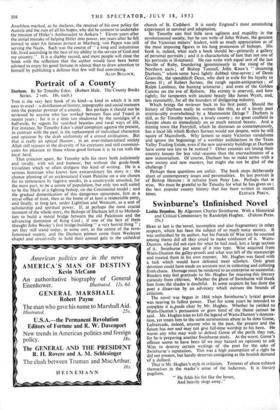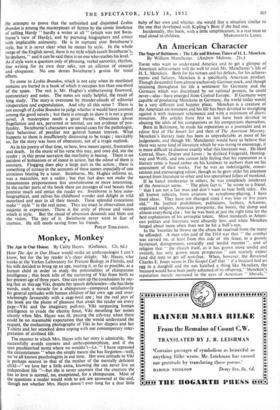Swinburne's Unfinished Novel
HERE at last is the 'novel, incomplete and also fragmentary in other respects, which has been the subject of so much noisy secrecy. It was unfinished by its author, but his friends (if Wise can be counted among them) did all they could to make confusion of it. Watts- Dunton, who did not care for what he had read, lost a large section of it. Swinbume put some of it into type. Wise acquired from Watts-Dunton the galley-proofs and what was left of the manuscript and treated them in his own manner. Mr. Hughes was faced with a task which would have defeated most scholars. Only great devotion could have made an accurate text in collecting and from chaos. Homage must be rendered to an enterprise so successful. Readers may feel gratitude to Mr. Hughes for rescuing this literary curiosity from oblivion. Whether the ghost of Swinburne will thank him from the shades is doubtful. In some respects he has done the poet a disservice by an advocacy which outruns the bounds of criticism.
The novel was begun in 1864 when Swinburne's lyrical genius was nearing its fullest power. That for some years he intended to complete it is4nade clear by Mr. Hughes. Whether he yielded to Watts-Dunton's persuasion or grew tired of the theme cannot be said. Mr. Hughes tries to kill the legend of Watts-Dunton's domina- tion, yet treats him to the same acrimonious abuse as he does Gosse, Lafourcade, indeed, anyone who in the past, the present and the future has not and may not give full-time worship to his hero. He warns any who may wish to defend Gosse of the perils they run, for he is preparing another Swinburne study. At the worst, Gosse's offence seems to have been (if we may hazard an opinion) to ask Wise to destroy certain writings of the poet for the sake of Swinburne's reputation. This was a high assumption of a right he did not possess, but hardly deserves castigating as the brutish demand of a dullard. That is Mr. Hughes's style in criticism. Torrents of abuse exhaust themselves in the reader's sense of the ludicrous. It is literary pugilism. " He folds his fist like the boxer, And heavily slogs away." He attempts to prove that the unfinished and disjointed Lesbia Brandon is among the masterpieces of fiction by the comic insolence of calling Hardy "hardly a writer at all" (which was not Swin- bume's view of Hardy), and by pursuing biographers and critics with implacable animosity. He is in raptures over Swinbume's style, but it is never clear what he means by style. In the whole range of the English novel, there is no style which excels Swinburne's, he declares," and it can be said there is no one who reaches his level." As if style were a question only of phrasing, verbaInarcotics, rhythm, fine writing for its own dear sake, not an alliance of concept and eloquence. No one denies Swinburne 's genius for tonal effects.
To come to Lesbia Brandon, which is not eab, when its mutilated remains are buried in a book of which it occupies less than one-third of the space. The rest is Mr. Hughes's embarrassing foreword, commentary and notes. The notes are really 'helpful, the result of long study. The story is overcome by thunder-clouds of editorial vituperation and expostulation. And why all this noise ? There is not enough of Lesbia Brandon to judge whether it would have counted among the good novels ; but there is enough to show it is not a great novel. A masterpiece needs a great theme. Obsessions about flagellation and sex, perverted or normal, are not evidence of pro- fundity. Swinbume's characters are special cases for the pathologist, their behaviour, of peculiar not general human interest. What happens to them is insufficiently distressing to be tragic ; inevitably so, for the story was born of obsessions, not of a tragic outlook.
As in his poetry of that time, so here, love means agony, frustration and death. In the music of his verse this may, and once did, stir the reader ; in this prose narrative the morbidity is boring. There is no incident of lesbianism or of incest in action, but the odour of them is constant. Flogging does play a large part in the action; there is something of ecstasy in the accounts of these scenes, especially of ope atrocious beating by a tutor. Swinburne, Mr. Hughes informs us, was a masochist, not a sadist ; but that fact does not make the monotonous prepossession less unwholesome or more interesting. In the earlier parts of the book there are passages of real beauty that promise much and entice the reader on. Swinburne is here auto- biographical, and relives his childhood wonder and delight in wild moorland and seas in all their moods. These splendid evocations make" style "in the real sense. They are exact in observation and majestic in expression. There is the unity of phrase and vision which is style. But the cloud of obsession descends and blots out the vision. The pity of it. Swinburne never went in fear of enemies. He still needs saving from his friends.
PHILIP TOMLINSON.



































 Previous page
Previous page